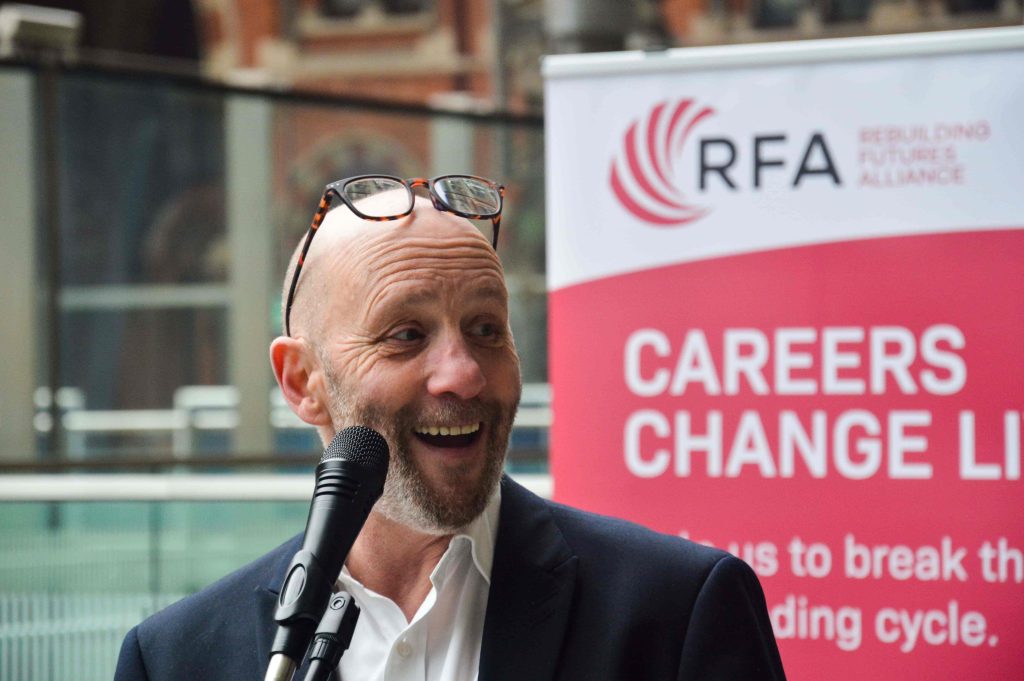In January, Women in Bus and Coach founder Louise Cheeseman approached routeone to reveal she had become chair of a new charity trying to address what some call “the remaining taboo” on equity, diversity and inclusivity (EDI).
The charity, the Rebuilding Futures Alliance (RFA), has a mission to encourage ex-offenders into meaningful careers within transport. The benefits of doing so are manyfold.
One third of the UK prison population (predicted to be 114,800 by 2028) are ‘low level repeat offenders’, according to the charity’s findings, and one out of two will go back into prison within six months if they do not secure a job. Where a job is secured, only one in five will return. Not only does that benefit the ex-offender, the burden on the economy of reoffending in that scenario drops from £18.1 billion to £5 billion per year.

Nine months in the making
The launch of RFA was nine months in the making. Founder is Chris Leech MBE, a former railway guard and driver who latterly embarked upon many years of community engagement work before becoming a consultant delivering social value programmes.
RFA spawned after Chris supported a charity in Leeds run by two prison officers seeking to get ex-offenders into full-time work.
The charity had a 95% success rate, but was exclusively focusing on logistics. Chris saw more opportunities. Another hindrance was that the charity was funded through donations, so a large amount of time was spent fundraising when that time could be better spent delivering on service.
For an employer, much of the challenge in recruiting ex-offenders comes through the due diligence required — not to mention the disparate nature of how recruitment of ex-offenders is managed. RFA found at least 100 charities delivering such services nationwide. A major bus operator looking to recruit candidates in Devon, for example, would have three charities to choose from. If successful, there would be no simple way to replicate that in other regions without starting over again. That makes consistent recruitment from the pool of ex-offenders a time-consuming process, and a hindrance to businesses wanting to do the right thing.
RFA hopes to fix that by establishing a network of those charities, a single voice to call for funding, and by acting as a body that will share best practice among its partners.
“This is about efficiency and productivity, so we need to be able to support the employers,” Chris explains. “We recognised that, if we could create a not-for-profit alliance that represents the entire transport sector, we could trial a programme that acts a shop window for charities across the network, amplify their messages, and create the scale and authority to encourage businesses to work together and get people into full-time work.”
Underpinned by desistance
Desistance is the process of ceasing and refraining from criminal or antisocial behaviour after a period of engagement in such activities. It is captured in three stages and underpins what RFA intervention is trying to deliver.
To be successful, the individual must:
- Want to stop reoffending and commit to change.
- Attain a new identity – become someone who has completed their sentence and has renewed purpose, a future, and career.
- Find belonging: The final, and a very critical stage — the individual must become part of a community that values and recognises his or her work.
Tracking and monitoring are crucial components of the process. RFA does not do anything unless it can be measured. The charity has worked with a supplier called Genius that has built a system to track and monitor individual candidates, allowing engagement and intervention until they gain employment. Chris says the system generates rich data insights that could influence regional and national policy reform. It is the first organisation to do so in its field.
“Meanwhile, the employer gets a very loyal individual whom they will know more intimately than most of their workforce,” adds Chris. “That’s the irony — employers get full disclosure of these individuals’ background, so they know more about them than they would through other means.”
The financial model is simple. Employers working with the charities pay £3,000 for each of the first three individuals within that organisation, two thirds of which goes to the charity supporting them. Employer and candidate are given six to 12 months of 24/7 support to ensure the correct culture is in place and that both have their needs and challenges met. “We know that after six to 12 months the cycle of reoffending is broken and we have a successful outcome,” says Chris.
After the first three candidates, the cost reduces to £1,500 per individual. That comes down to a relationship with HR directors and an easing of due diligence requirements.
A partnership with the Rail Safety and Standards Board and social value software provider and consultancy Loop has resulted in a social value tool tracked to the treasury. The tool is backed by the Department for Transport and Network Rail. Where an individual is sponsored, or donations made, businesses gain a social economic impact report that is bespoke and can be used in environmental, social, and governance or shareholder reporting. “This lets a business demonstrate what it has done within its community. Businesses deserve to see a return on that investment,” says Chris.
Social value and engagement
Engagement with social value is now more important than ever for businesses looking to win tenders. In February the government’s latest version of the National Procurement Policy came into effect, alongside introduction of the new Procurement Act 2023.
The policy statement sets out the priorities for public procurement and how contracting authorities should support their delivery.
Combined authorities and franchises will be measured against its framework; page four outlines how social and economic value should be delivered, and includes metrics such as maximising procurement spend with SMEs and voluntary, community and social enterprises; ensuring suppliers are committed to providing high quality jobs; opportunity and progression for workers; maximising public benefit; and working collaboratively to deliver social and economic value.
RFA points out that its scheme aligns perfectly with these economic and social goals, addressing businesses’ KPIs without increasing financial or operational pressure.
Meanwhile, the collapse of European funding means more charities in RFA’s segment are bidding for the same pot — but the organisation hopes to bring continuity and structure to create a unified approach.
It is already partnered with the Department for Work and Pensions, which has provided a relationship manager to maximise support. But it now needs to demonstrate that the system works across transport — which is where the industry comes in. Operators can show their support in three ways: Through donations, sponsoring a candidate within their community, or by employment.
“It’s an easy, transferrable model that can be delivered,” Chris says. “I am really hopeful, but we need support from operators, especially the large groups. That will not only create more impactful projects and processes, but it will reduce costs, increase efficiencies and deliver a better workforce. One operator recently committed to investing about £500 million in new buses. But it’s in these pockets that we need to invest, too.
“We still have Founding Partner opportunities available and would welcome a conversation to explain how RFA can support their company’s EDI and social value impact strategies. You will be joining a number of existing major operators, suppliers and other responsible businesses in our mission.”

Collaborative working is key
There are many years of precedent behind RFA’s aims. Chris’s first community engagement role in the rail industry was focused on youth crime and education following incidents of trespass. It was a success, and crime was reduced by up to 47% in some of the hotspot areas. That started “a new era of community engagement”, he says, safeguarding the network and increasing passenger footfall. Other initiatives followed, including a code of conduct for schoolchildren that put the onus on schools to educate children and encourage them to report disturbances, and an improvement of rail safety standards through Track-Off, a youth group crime programme that lasted for five years and which reduced crime by 53% in hotspot areas such as Manchester, Hull and Twickenham.
That success came down to collaborative frameworks, according to Chris. It created a long-term legacy. But in what Chris says was a short-sighted move, funding was cut after targets were reached — the programme was a victim of its own success. Youth crime has since risen.
Chris has since developed social value programmes for train operating companies and bus operators. He believes there are two issues in the industry: Man management issues, and engineering management issues. Everything else incurred is “societal”.
“Why do we try and combat these issues in isolation?” he asks. “We increase security, or we increase CCTV. We invest in infrastructure. But what we should be developing is a community framework in each region.”
These interventions create a portfolio of opportunities to encourage passengers back onto the network.
“It wasn’t just about the operators,” Chris adds. “It was about working with the entire industry. It includes the supply chain — the biggest community footprint that transport has is its suppliers. By working with suppliers we all share the same vision — a community framework where everybody has to pull together to reduce costs and increase impact. It’s a simple exercise.”
Through his consulting work, Chris and his colleagues look at issues and bring in key partners to help address them, working to a framework that is measurable and impactful. In a simple example, if there were social issues around a bus terminal, he would work with local police, councils, community groups and other key partners with budgets that target the same group of individuals.
A lot of it is about perception, Chris says. “These kids don’t often know they’re committing a crime. It’s about education, reinforcement and diversion.”
Those social value programmes have been delivered in Europe and to business leaders from across bus, rail and aviation.




























